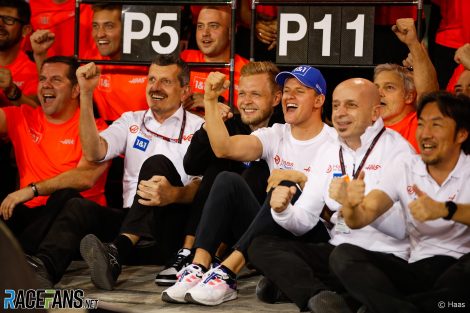Guenther Steiner’s plainspoken and self-deprecating manner, punctuated by the odd profane outburst in moments of frustration, made him a breakout star of Netflix’s hit F1 series Drive to Survive.
For a team which tended to compete in the lower half of the midfield, Steiner enjoyed a profile closer more like those at the helm of F1’s best-known and most competitive outfits, such as Red Bull’s Christian Horner or Mercedes’ Toto Wolff.
Now, eight years after Steiner brought F1’s newest team into the championship, Haas has decided he is no longer the person to take them forward.
Steiner is the latest in a series of team principals to find himself moved aside for performance reasons. Similar changes have taken place at Alpine and Ferrari within the last 12 months.
But Steiner’s position at Haas was different to those other bosses as he had done so much to bring the team into F1 to begin with. He had sounded out Ferrari to serve as a supplier of engines and other vital parts, and sold Gene Haas on the plan. His connections within F1 helped smooth the entry of the most recent new team to arrive in the sport – a difficult process to navigate, as Andretti is presently discovering.
Haas also enjoyed a remarkably successful start to life in F1 for a new team. The Ferrari deal Steiner masterminded deserved much of the credit for that. Rival teams variously emulated the approach or pressed for rules changes to the advantage Haas had gained.
The clamour over Haas’ performance was loudest when they turned up in F1 and scored sixth on their debut, courtesy of Romain Grosjean in Melbourne, then went one place better at the next race in Bahrain. They finished eighth in the championships over the first two seasons, then rose to fifth in 2018 (gaining one place as a result of Force India’s mid-season change of owner and identity).
Advert | Become a RaceFans supporter and
Things began to go awry for Haas in 2019 when it was perplexed by an ill-behaving car and distracted by a public row with its new title sponsor. This was the year the Netflix cameras captured Steiner’s notorious ‘fok smash my door’ remark at Silverstone, and the lengthy telephone debriefs with Gene Haas about the team’s latest setbacks.

Haas was therefore in a vulnerable position when the Covid-19 pandemic struck the following year. The team only avoided sinking to last in the standings by three points and Steiner admitted they were close to collapse.
In 2021 they did finish last, after Steiner took the calculated gamble of effectively writing off the season. He replaced their experienced drivers with a pair of rookies, which brought or attracted vital sponsorship, and the team elected not to develop its latest car, throwing its weight onto its 2022 machine in order to capitalise on a major change in the regulations.
At the beginning of the next season it seemed Steiner had played his cards and had fortune on his side. Factors beyond his control had forced the ousting of their underperforming rookie, Nikita Mazepin, allowing the experienced Kevin Magnussen to return. He found the VF-22 a competitive machine from the off and delivered fifth place at the opening round in Bahrain, the team’s best result for four years.
As the season neared its end, Magnussen scored an inspired and opportunistic pole position for the sprint at Interlagos. But given the team’s early promise, eighth in the final standings seemed less than they should have been capable of – even taking into account Mick Schumacher’s slight contribution to their points tally following a few too many crashes, amply highlighted in another Steiner-focused episode of Drive to Survive.
Their 2023 performance therefore came as a significant disappointment. Steiner got the experienced driver line-up he was keen for, pairing Magnussen with Nico Hulkenberg, yet the season felt like a repeat of 2019 at times. The VF-23 was beset with serious rear tyre degradation problems, and a string of promising qualifying performances resulted in precious few points.
Advert | Become a RaceFans supporter and
The team hit a low after introducing a heavily revised chassis at the Circuit of the Americas, the 18th round of 22. It wasn’t enough to prevent them sinking to last place, and Hulkenberg reverted to the early-season specification for the final races.

He made his frustration plain at the team’s failure to make progress. “The lack of development is a disappointment,” he said at the season finale in Abu Dhabi. “It’s not great.
“It’s not good enough, frankly, and we have to address that. We have to do a better job next year because we started off, I think, in a decent position, but we just didn’t find performance. We just didn’t improve the car and others did, substantially, and that’s why we got left behind.”
Even in its strongest seasons, Haas had a tendency to fall behind its rivals over the course of a championship. That, plus their failure to build on their strong start under the current technical regulations, appears to have finally spelled the end for Steiner.
In the press release announcing his replacement by Ayao Komatsu, Gene Haas made it clear the team’s lack of results is the reason behind its change at the top. “It was clear we need to improve our on-track performances,” said the team owner.
“We have had some successes, but we need to be consistent in delivering results that help us reach our wider goals as an organisation,” he added.
Advert | Become a RaceFans supporter and
Steiner achieved a great deal for Haas in bringing it into F1 and establishing it as a credible team. Few get the opportunity to do that in the first place, and making a success of it is a massive challenge.
The team’s fall too last place in the championship three years ago could be seen within the context of the decisions it had to make to ensure its survival following the Covid years. But propping up the table for the second time in three years, following the promising start made in 2022, proved one setback too many, and the team now feels a change at the top is needed to make the next step forward.
As Steiner admitted in the unvarnished style which makes him such a breath of fresh air in F1, he is the person who has to be held accountable for the team’s situation. “Another thing that the managers these days are very good at is blaming the team when something goes wrong,” he wrote last year in his book Surviving to Drive. “If I fail at something I cannot blame Ayao or Pete [Crolla, trackside operations manager] or Gene Haas. I blame me and I have to take full responsibility.”
Formula 1
Browse all Formula 1 articles

